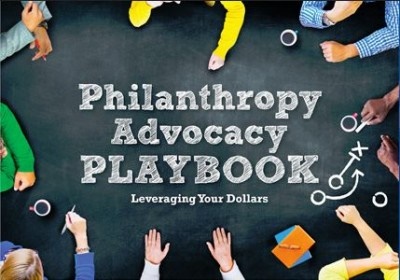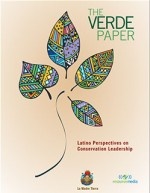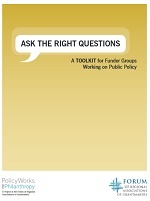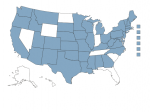Foundations on the Hill: Get Ready to Advocate Webinar
This webinar for both public and private foundations covers:
- Various advocacy roles for foundations, including advocacy activities that are permissible for both public and private foundations
- Definitions of lobbying
- Activities that are exceptions to the definitions of lobbying
- An overview of proposed legislation that could affect the work of Philanthropy Southwest members and their grantees.
View the recording here.
Regulations Regarding State and Local Tax (SALT) Credits
The Treasury Department has issued proposed regulations regarding state and local tax credits.This is largely in response to the State and Local Tax (SALT) workarounds that were generated following the Tax Cuts and Jobs Act of 2017. The deadline for submitting comments on these proposed regulations is prior to the November 5 public hearing. Please refer to this list to see how these regulations will impact specific state and local tax credits, not just the new workarounds.
2020 Census: Citizenship Question Resources for Foundations
On March 29, 2018, the Census Bureau sent the planned 2020 census survey, which included a citizenship question, as requested by Commerce Secretary Wilbur Ross. Many are concerned that the addition of this untested question will undermine efforts to achieve a fair and accurate census count in 2020, which helps grantmakers identify community needs and prioritize grantmaking. On June 8, the Commerce Department (which oversees the Census Bureau) invited the public to comment on the paperwork associated with the 2020 census. The public has 60 days – until August 7 – to submit comments. The notice and form to submit comments can be found here. For those interested, The Funders Census Initiative, under the leadership of the Bauman Foundation, is circulating a sign-on letter for foundations. To add your foundation's name to this letter, click here. Signatures will be collected until July 16, 2018.
Charitable Giving Coalition Tax Reform Survey
The Charitable Giving Coalition (CGC), made up of hundreds of charities and associations involved in providing philanthropic services to communities across the country, is examining the impact of tax changes on charitable giving throughout 2018 and beyond. To illustrate this impact, CGC created a survey that may be distributed to grantees and other nonprofit organizations about the need for services in their community and giving trends over the past six months. This information will be used to communicate with policymakers, including members of Congress, about how the tax changes are affecting giving and whether or not additional legislation or amendments are warranted to correct problems and help increase giving. CGC seeks both quantitative responses (numbers and percentages) as well as qualitative responses to help frame giving and service challenges in all communities. Access the survey here. If you or your grantees have any questions, please contact paffairs@afpnet.org. The deadline for survey submission is July 13, 2018.
Universal Charitable Deduction Update
The 2017 tax law included changes that are predicted to impact the charitable sector, including the nearly doubling of the standard deduction. Below are two bills introduced to help offset the anticipated decrease in charitable giving.
In May 2018, Reps. Chris Smith (R-NJ) and Henry Cuellar (D-TX) introduced the Charitable Giving Tax Deduction Act (H.R. 5771), a bipartisan bill that would help to incentivize individuals’ charitable giving through a universal, above-the-line charitable deduction accessible to all taxpayers. Learn more.
In late 2017, Rep. Mark Walker (R-NC) and Sen. James Lankford (R-OK) introduced the Universal Charitable Giving Act, which would extend a charitable deduction to non-itemizers that would be capped at one-third of the standard deduction ($4,000 for single filers and $8,000 for married couples filing jointly). Learn more about H.R. 3988 and S.2123.
Philanthropy Southwest Foundation Advocacy Factsheet
Private and public foundations may participate in many forms of advocacy activities and may also fund advocacy. This factsheet provides an overview of the Dos and Don'ts of Foundation Advocacy.
Introducing StateScape - Legislative and Regulatory Tracking Tool - a Philanthropy Southwest member benefit!
Philanthropy Southwest member benefit StatesScape allows individuals to track legislation introduced across the Southwest and to customize legislative updates based on individual preferences. Bills may be monitored at every stage to ensure advance notice of important proposals affecting a particular funding sector, state and/or region. To gain access to this legislative tracking tool for advocacy or compliance purposes, email Lauren Haskins and specify "StateScape" in the subject line.
Philanthropy Advocacy Playbook: Leveraging Your Dollars
Is your foundation interested in confidently supporting advocacy? Alliance for Justice’s Philanthropy Advocacy Playbook provides information on 11 benefits and conversation-starters about philanthropic advocacy and lobbying. Specifically, it answers your questions about legal rules and provides concrete examples, templates, resources, and tips.
Verde Paper: Latino Perspectives on Conservation Leadership
As America becomes more diverse, so too are our social movements diversifying — and better integrating the diversity they've held within them all along. That's the context for the "Verde Paper," an exploration of Latinos in the environmental movement, which holds important lessons for advocates and philanthropists who want to better support and partner with Latino communities.

Ask the Right Questions: A Toolkit for Funder Groups Working on Public Policy
How can funders work together to have an impact on public policy? PolicyWorks for Philanthropy has been asking this question as part of an effort to help affinity groups use policy engagement as a strategy to achieve shared program goals. We’ve taken what we’ve learned so far and turned it into this toolkit, designed for structured group reflection, including a set of planning checklists that affinity groups can use to do policy work and regional associations can use to support that work.

State Priorities Partnership
The State Priorities Partnership is a network of more than 40 independent, nonprofit research and policy organizations, using evidence and analysis to advance policies that give more people the opportunity to prosper.

| Attachment | Size |
|---|---|
| 264.31 KB |
